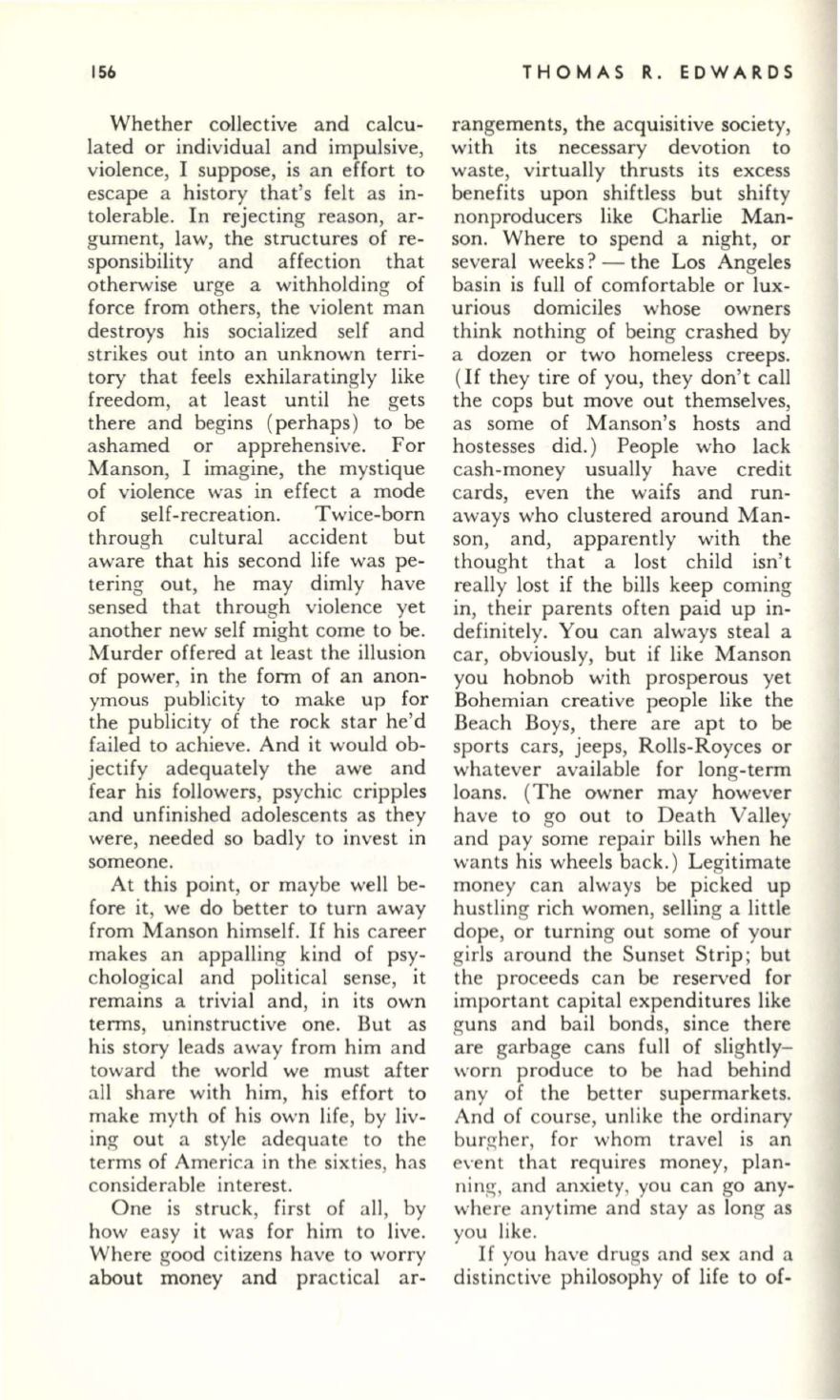
156
Whether collective and calcu–
lated or individual and impulsive,
violence, I suppose, is an effort to
escape a history that's felt as in–
tolerable. In rejecting reason, ar–
gument, law, the structures of re–
sponsibility and affection that
otherwise urge a withholding of
force from others, the violent man
destroys his socialized self and
strikes out into an unknown terri–
tory that feels exhilaratingly like
freedom, at least until he gets
there and begins (perhaps ) to be
ashamed or apprehensive. For
Manson, I imagine, the mystique
of violence was in effect a mode
of
self-recreation.
Twice-born
through cultural accident but
aware that his second life was pe–
tering out, he may dimly have
sensed that through violence yet
another new self might come to be.
Murder offered at least the illusion
of power, in the form of an anon–
ymous publicity to make up for
the publicity of the rock star he'd
failed to achieve. And it would ob–
jectify adequately the awe and
fear his followers, psychic cripples
and unfinished adolescents as they
were, needed so badly to invest in
someone.
At this point, or maybe well be–
fore it, we do better to turn away
from Manson himself.
If
his career
makes an appalling kind of psy–
chological and political sense, it
remains a trivial and, in its own
terms, uninstructive one. But as
his story leads away from him and
toward the world we must after
all share with him, his effort to
make myth of his own life, by liv–
ing out a style adequate to the
terms of America in the sixties, has
considerable interest.
One is struck, first of all, by
how easy it was for him to live.
Where good citizens have to worry
about money and practical ar-
THOMAS R. EDWARDS
rangements, the acquisitive society,
with its necessary devotion to
waste, virtually thrusts its excess
benefits upon shiftless but shifty
nonproducers like Charlie Man–
son. Where to spend a night, or
several weeks? - the Los Angeles
basin is full of comfortable or lux–
urious domiciles whose owners
think nothing of being crashed by
a dozen or two homeless creeps.
(If
they tire of you, they don' t call
the cops but move out themselves,
as some of Manson's hosts and
hostesses did.) People who lack
cash-money usually have credit
cards, even the waifs and run–
aways who clustered around Man–
son, and, apparently with the
thought that a lost child isn' t
really lost if the bills keep coming
in, their parents often paid up in–
definitely. You can always steal a
car, obviously, but if like Manson
you hobnob with prosperous yet
Bohemian creative people like the
Beach Boys, there are apt to be
sports cars, jeeps, Rolls-Royces or
whatever available for long-term
loans. (The owner may however
have to go out to Death Valley
and pay some repair bills when he
wants his wheels back.) Legitimate
money can always be picked up
hustling rich women, selling a little
dope, or turning out some of your
girls around the Sunset Strip; but
the proceeds can be reserved for
important capital expenditures like
guns and bail bonds, since there
are garbage cans full of slightly–
worn produce to be had behind
any of the better supermarkets.
And of course, unlike the ordinary
burgher, for whom travel is an
event that requires money, plan–
ning, and anxiety, you can go any–
where anytime and stay as long as
you like.
If
you have drugs and sex and a
distinctive philosophy of life to of-


